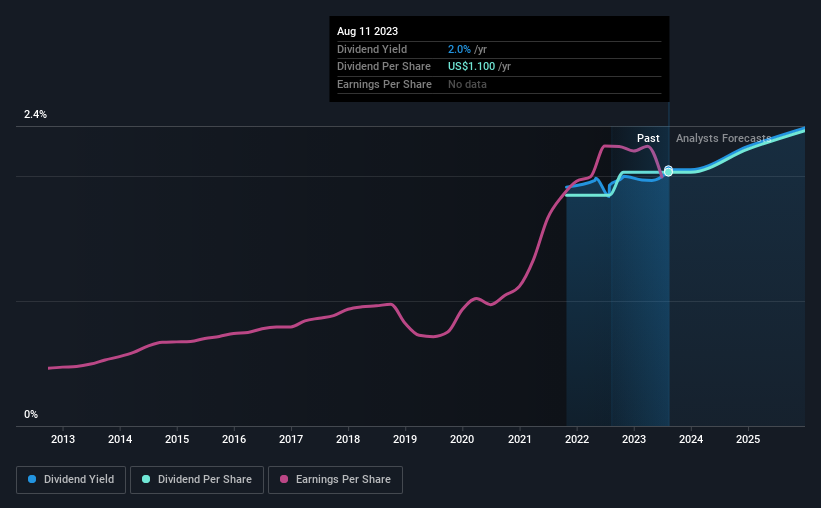Is It Smart To Buy LKQ Corporation (NASDAQ:LKQ) Before It Goes Ex-Dividend?
LKQ Corporation (NASDAQ:LKQ) is about to trade ex-dividend in the next 3 days. The ex-dividend date is usually set to be one business day before the record date which is the cut-off date on which you must be present on the company's books as a shareholder in order to receive the dividend. The ex-dividend date is an important date to be aware of as any purchase of the stock made on or after this date might mean a late settlement that doesn't show on the record date. This means that investors who purchase LKQ's shares on or after the 16th of August will not receive the dividend, which will be paid on the 31st of August.
The company's next dividend payment will be US$0.28 per share, on the back of last year when the company paid a total of US$1.10 to shareholders. Last year's total dividend payments show that LKQ has a trailing yield of 2.0% on the current share price of $53.66. Dividends are a major contributor to investment returns for long term holders, but only if the dividend continues to be paid. So we need to investigate whether LKQ can afford its dividend, and if the dividend could grow.
View our latest analysis for LKQ
Dividends are typically paid out of company income, so if a company pays out more than it earned, its dividend is usually at a higher risk of being cut. LKQ paid out a comfortable 29% of its profit last year. That said, even highly profitable companies sometimes might not generate enough cash to pay the dividend, which is why we should always check if the dividend is covered by cash flow. Thankfully its dividend payments took up just 30% of the free cash flow it generated, which is a comfortable payout ratio.
It's positive to see that LKQ's dividend is covered by both profits and cash flow, since this is generally a sign that the dividend is sustainable, and a lower payout ratio usually suggests a greater margin of safety before the dividend gets cut.
Click here to see the company's payout ratio, plus analyst estimates of its future dividends.
Have Earnings And Dividends Been Growing?
Businesses with strong growth prospects usually make the best dividend payers, because it's easier to grow dividends when earnings per share are improving. If business enters a downturn and the dividend is cut, the company could see its value fall precipitously. For this reason, we're glad to see LKQ's earnings per share have risen 16% per annum over the last five years. Earnings per share are growing rapidly and the company is keeping more than half of its earnings within the business; an attractive combination which could suggest the company is focused on reinvesting to grow earnings further. This will make it easier to fund future growth efforts and we think this is an attractive combination - plus the dividend can always be increased later.
Another key way to measure a company's dividend prospects is by measuring its historical rate of dividend growth. Since the start of our data, two years ago, LKQ has lifted its dividend by approximately 4.9% a year on average. It's good to see both earnings and the dividend have improved - although the former has been rising much quicker than the latter, possibly due to the company reinvesting more of its profits in growth.
The Bottom Line
Has LKQ got what it takes to maintain its dividend payments? LKQ has been growing earnings at a rapid rate, and has a conservatively low payout ratio, implying that it is reinvesting heavily in its business; a sterling combination. There's a lot to like about LKQ, and we would prioritise taking a closer look at it.
So while LKQ looks good from a dividend perspective, it's always worthwhile being up to date with the risks involved in this stock. Every company has risks, and we've spotted 1 warning sign for LKQ you should know about.
If you're in the market for strong dividend payers, we recommend checking our selection of top dividend stocks.
Have feedback on this article? Concerned about the content? Get in touch with us directly. Alternatively, email editorial-team (at) simplywallst.com.
This article by Simply Wall St is general in nature. We provide commentary based on historical data and analyst forecasts only using an unbiased methodology and our articles are not intended to be financial advice. It does not constitute a recommendation to buy or sell any stock, and does not take account of your objectives, or your financial situation. We aim to bring you long-term focused analysis driven by fundamental data. Note that our analysis may not factor in the latest price-sensitive company announcements or qualitative material. Simply Wall St has no position in any stocks mentioned.

